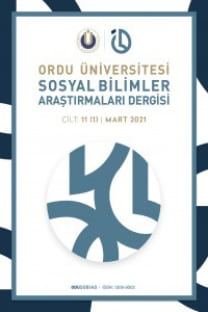Postmodern Historiography in Michael Ondaatje's Running in The Family
Postmodernizm, tarih yazımı kavramını tekrar gözden geçirir ve bu akım, tarihinde aynı edebiyat gibi insan
tarafından oluşturulması nedeniyle tarih ve kurmaca arasındaki net ayrımı sorgular. Bunun yanı sıra,
postmodern düşünürler tarihçinin rolünü ve tarihin nasıl üretildiğini irdeler. Tarih yazarının kendi duygu ve
yargılarına sahip bir insan olmasından dolayı öznel ve ideolojik tutumlardan muaf tutulamayacağını savunur.
Bu çalışmada postmodern düşünürlerin ilgili görüşleri ve özellikle Linda Hutcheon' ın tarih yazımı konusundaki
fikirlerini temel alınarak Sri Lanka doğumlu Kanadalı yazar Michael Ondaatje' ye ait Running in the Family (Aİle
İçinde Olanlar, 1982) olan otobiyografik roman derinlemesine incelenmiştir. Sırasıyla yazarın doğum yerinin
ulusal tarihini, aile bireylerinin geçmişlerini ve yazarın okurlarına sunduğu farklı metinlerle tarihin nasıl
sorunsallaştırıldığını analiz etmek amaçlanmıştır. Bu makale tarih yazarının ve nesnel tarih yazımının
güvenilirliği ile ilgili sorulara cevap aramaktadır. Bu bağlamda, tarihin yorumlar ve yorumcuların zenginliğinden
dolayı, bir belirsizlik durumu olduğu tartışılmaktadır.
Anahtar Kelimeler:
postmodernizm, tarih yazımı, tarihsel üstkurmaca, Michael Ondaatje, Aile içinde olanlar
Postmodern Historiography in Michael Ondaatje's Running in The Family
Postmodernism redefines the term of historiography, and it questions the clear-cut distinction of history and fiction
since the movement maintains a notion that history is constructed by human beings just like literature.
Furthermore, postmodern thinkers interrogate the role of a historiographer, and how history is generated. They
claim that historiography cannot exclude itself from the subjective or ideological manners of the historiographer
as he is a person with his own emotions and judgements. Along with the related premises of postmodern scholars,
and with the framework of Linda Hutcheon's ideas upon historiography in particular, this study is based on a close
reading of an autobiographical novel of Michael Ondaatje. The present article aims to analyze the novel in terms
of how history is problematized in the context of the national history of the author's birthplace, the past of his family
members, and the intertexts that Ondaatje offers to his readers. The article seeks answers to the questions that are
related to the credibility of a historian and generating an objective history. In this regard, it is argued that history
exists in a state of uncertainty due to the wealth of interpreters and interpretations.
Keywords:
postmodernism, historiography, historiographic metafiction, Michael Ondaatje, Running in the family,
___
- Barber, R. (2010). The Role Of Imagination in Writing and Reading Narrative. Retrieved 5 January 2021, from https://www.researchgate.net/publication/233152431
- Barthes, R. (1981). The Discourse of History. Retrieved 5 April 2021 From http://seas3.elte.hu/coursematerial/LojkoMiklos/Roland_Barthes__The_Discourse_of_History.pdf
- Barthes, R. and Howard, R. (1982). Camera Lucida. 2nd ed. New York: Hill and Wang.
- Carr, E. H. (1990). What is History? London: Penguin.
- Himmelfarb, G. (2002). Telling It As You Like It: Postmodernist History and the Flight From Fact. The Postmodern History Reader. Ed. Keith Jenkins. London: Routledge.
- Hume, K. (1984). Fantasy and Mimesis: Responses to Reality in Western Literature. New York and London: Methuen.
- Hutcheon, L. (1987). Postmodern Paratextuality and History. Retrieved 3 March 2021, from https://tspace.library.utoronto.ca/bitstream/1807/9477/1/TSpace0031.pdf
- Hutcheon, L. (1988). A Poetics of Postmodernism. New York: Routledge.
- Jackson, R. (1981). Fantasy: The literature of Subversion. New York and London: Methuen. Jenkins, K. (2003). Rethinking History. London: Routledge.
- Lee, A. (1990). Realism and Power. Postmodern British Fiction. London: Routledge.
- Lyotard, J. F. (1989). The Postmodern Condition: A Report on Knowledge. Manchester: Manchester UP Print.
- Marshall, B. K. (1992). Teaching the Postmodern: Theory and Fiction. New York: Routledge.
- Ondaatje, M. (1982). Running in the Family. New York: Vintage Intl..
- Southgate, B. C. (2005). What is History For? London: Routledge.
- Wesseling, E. (1991). Writing History As a Prophet. Postmodernist Innovations of the Historical Novel. Amsterdam and Phiadelphia: John Benjamins Publishing Company
- ISSN: 1309-9302
- Yayın Aralığı: Yılda 3 Sayı
- Başlangıç: 2010
- Yayıncı: -
Sayıdaki Diğer Makaleler
Postmodern Historiography in Michael Ondaatje's Running in The Family
Schwartz Değerler Ölçeği Bağlamında “Camdaki Kız” Dizisinin İçerik Analizi
An Investigation of Turkish EFL Instructors’ Beliefs about Writing in English
Covid-19 Sürecinde Kompulsif Satın Alma ve Ruhsal Travma Belirtilerinin Değerlendirilmesi
Burak ÇETİN, Asude Yasemin ZENGİN, Arzu YÜKSEL
II. Abdülhamit Karşıtı Bir Ön Söz: Abdullah Cevdet’in İki Emel Adlı Eseri (İnceleme-Metin)
